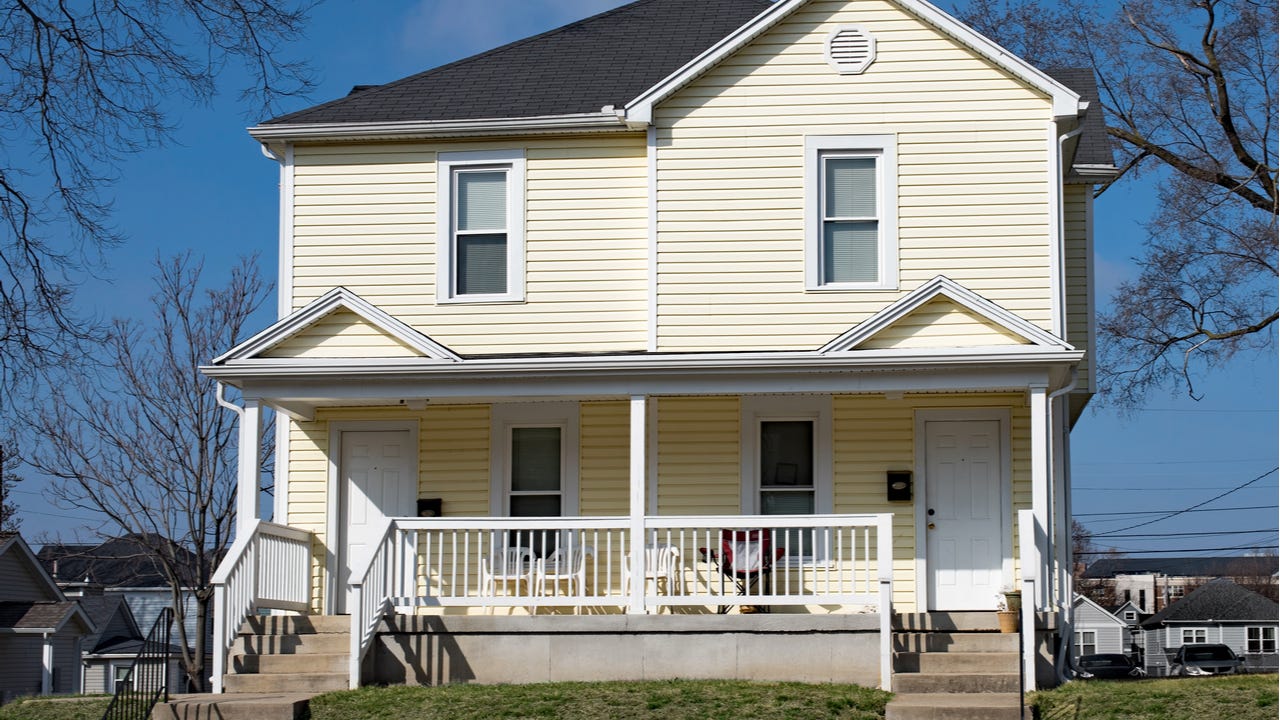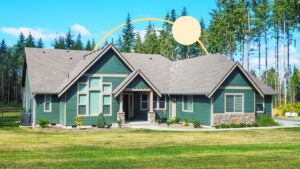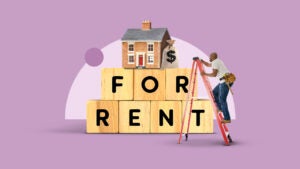What is a duplex?

In real estate, a duplex refers to a housing configuration that allows for two separate residential units within one structure. It’s a type of multi-family home that is kind of a cross between an apartment and a house — generally with more living space than the former, and a little less than the latter.
With home prices soaring, the multi-family housing market is exploding. In fact, according to the National Association of Home Builders (NAHB), multi-family housing starts as of December 2024 reached an annualized 449,000 pace. That’s an increase of 61.5 percent from the previous month.
There are both benefits and drawbacks about duplexes to live in or use as an investment, so weighing them is imperative to see if purchasing or occupying one works for you.
What is a duplex?
A duplex is a property that’s divided into two separate living units. Those units can be located side by side or stacked on top of one another (the “one-up, one-down”). There are separate entrances for each unit, and sometimes there are separate garages and yards, as well.
The interior layouts of the two units are usually identical, and they always have a shared wall.
Each unit in a duplex is identified by its own, individual street address. That means each half either has its own numerical address, or, if the street number is the same, each dwelling is labeled either “A” and “B,” or perhaps “1” and “2.”
Duplexes are not the only type of multi-family home of their kind: Others include triplexes and quadplexes. These structures work the same as duplexes but contain three or four units, respectively.
Typically, the property housing the duplex has a single owner. They may live in one half of the duplex and rent out the other. Or, they may rent out both halves.
What is a duplex apartment?
In some big cities, where apartment buildings are the norm, “duplex” takes on a slightly different meaning. It often refers to an apartment that spans two stories. An interior staircase — or sometimes a private elevator — connects the floors; each floor often has its own entrance into the building’s hallways. So in this case, the “duplex” refers to the number of levels of a single-family unit, not to a number of units.
What makes a duplex unique?
There are several different types of multi-family housing options, such as condominiums (condos) and townhouses. And while they and duplexes all have some features in common, such as shared walls, each has unique characteristics. Here’s a closer look at the features of each type of multi-family housing:
| Duplex | Condo | Townhome |
|---|---|---|
| Always have a shared wall | Several shared walls, including above and below | Shared walls, but no units above or below |
| Property divided into two separate living units | May resemble an apartment in a multi-unit building | Each unit owned by separate person |
| Units may be stacked on top of each other or side by side | Building and surrounding land owned and maintained by homeowners association | Townhouse owner possesses and is responsible for exterior, including front and back yards |
| Separate entrances for each unit and may have separate garages and yards | Owners responsible for maintenance of interior of unit | May come with shared amenities like clubhouse, pool or playground |
Duplex vs. twin home
Duplexes are often confused with, but are not the same as, twin homes. Both are multi-family dwellings with shared walls. They often look identical too. The crucial difference is that, with a duplex, both units occupy the same lot, while twin homes are located on separate lots — the property line runs through the shared wall. In short, a duplex is one structure bifurcated into two units while a twin home is two properties on one lot.
That means the twins can, and often do, have separate owners. The owner of each unit in a twin home is responsible for the property expenses on their side of the lot: maintenance costs, homeowners insurance, etc. In a duplex the occupant of one of the units generally is only renting and has no equity in the property — that belongs to the duplex’s owner in the other unit. Or, if the owner lives elsewhere, both units in the duplex are occupied by renting tenants.
Duplex vs. accessory dwelling unit
Duplexes are also distinct from accessory dwelling units (ADUs). ADUs have countless monikers, such as granny flats, garage studios or carriage houses, to name a few. An ADU can be attached to the main residence — it has its own entrance — or can be a small detached structure on the property lot.
With both duplexes and ADUs, there’s only one owner of record. The main difference is that the ADU is considered an extension of the main residence — even if it’s separated from it physically — while the duplex is a residence divided into two separate abodes. As such, they’re considered distinct properties, with separate mailing addresses; in contrast, with an ADU, the tenant and the homeowner share the same address.
Also, duplexes can only be built on lots or parcels zoned for multifamily construction. The ADU, in contrast, can be built in single-family construction zones (assuming local laws permit).
Buying a duplex: What to know
Buying a duplex can be a wise choice in various situations. Here’s when it might be a good fit:
- If you’re a real estate investor. A duplex is an especially common choice for beginner investors because of its flexibility and the relative ease of obtaining financing. If you’re planning to live in one of the units in your duplex, your options include a conventional loan, FHA loan, VA loan or 203(k) loan.
- If you’re being squeezed out of the housing market. Mortgage advisor Casey Fleming, author of “The Loan Guide: How to Get the Best Possible Mortgage” and “Buying and Financing Your New Homes,” says duplexes allow for a lower down payment and financing is generally less costly, he notes. As a result, the overall purchase is “cheaper.”
- If you’re looking to offset housing costs. As a duplex owner, you can live in one of the units while renting the other out to a tenant. That monthly rent will help offset the monthly mortgage payments, or maybe even cover them in full — essentially allowing you to live there for free.
- If you’re looking for tax deductions. Investing in a duplex gives you access to certain tax deductions. For example, you can take deductions for most of your expenses related to yard work, maintenance and repairs because the part of the home is considered an income property. Of course, “being a landlord is not for everyone,” Fleming cautions — especially in a duplex arrangement. Living next door to a tenant could also lead to them constantly knocking on your door with problems and requesting repairs to every little thing.
How to find duplexes for sale
Duplexes tend to get snapped up quickly on the real estate market. “There are always far fewer duplexes listed for sale than single-family homes, so it’s harder to find a good deal,” Fleming says.
If you’re set on a duplex, you can start your search on websites such as Zillow, Realtor.com and LoopNet. Networking with other real estate investors in a local group or association could also help you find the right deal in the area you’re hoping to buy in.
You might also consider working with a real estate agent to help you spot new properties as soon as they’re listed. If you go this route, you’ll likely need to demonstrate that you’re able to get financing promptly (pre-approved for a mortgage) or have another funding source lined up. Your lender may include the potential rental income from one or both units toward your income on your application (likely reduced a little to account for vacancies).
What if you don’t plan to live in one of the units of a duplex?
Another factor to keep in mind is that if you’re not planning to live in one of the units, the duplex will be considered a full investment property (as opposed to a residence), and interest rates are typically higher on investment properties than residential ones. The down payment requirements can vary, too.
“An owner-occupied duplex requires 15 percent down, and an investment property duplex requires 25 percent down,” Fleming explains.
Additionally, the lender may want to review local rental rates or other market data to ensure that the investment is likely to be successful.
Duplex living: pros and cons
There are benefits and drawbacks to purchasing a duplex. Some are dependent on whether you plan on buying the property, living in one half and renting the other out or if you intend on renting both sides to tenants.
Pros
- A duplex can provide up to two sources of rental income, but you don’t necessarily have to pay twice as much as if you were buying a single-family home.
- If your duplex has a yard, driveway or garage, you may be able to charge higher rent to tenants wishing to use those amenities.
- If you have a family member who needs support, such as an elderly parent, you can keep them close by in a duplex without living in the same household. (Note: You may not be able to take additional tax deductions if you’re renting to a family member.)
Cons
- Duplexes aren’t as common as single-family homes, so you may have fewer options to choose from.
- If you end up with tenants who are noisy or bothersome, it could be difficult living in proximity to them.
Real estate investment isn’t for the faint of heart: Property values can decline. And the business responsibilities of being a landlord can weigh heavily.
Additional reporting by Tami Kamin Meyer
Why we ask for feedback Your feedback helps us improve our content and services. It takes less than a minute to complete.
Your responses are anonymous and will only be used for improving our website.
You may also like







